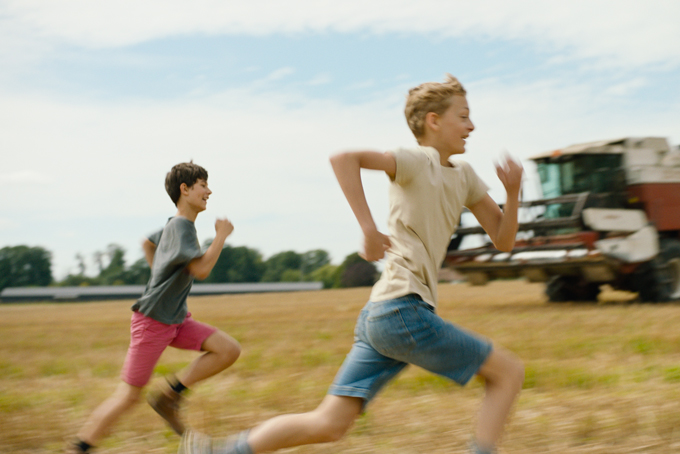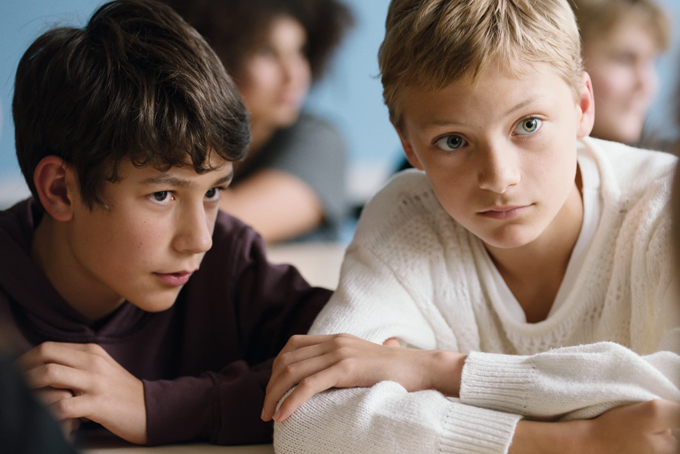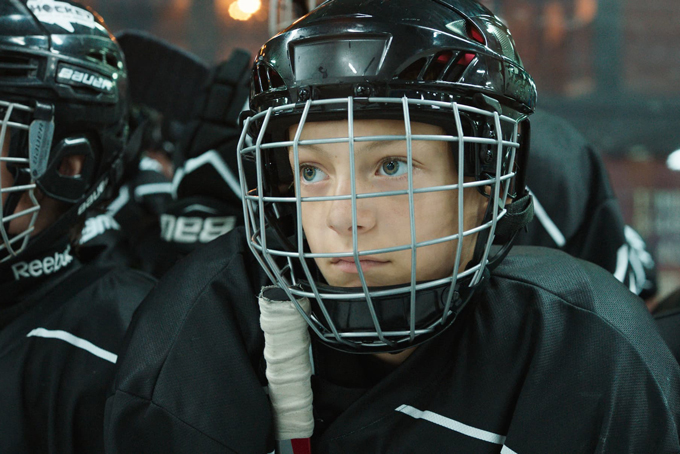Warning: This article contains spoilers and sensitive issues such as self-harm and bullying.
Towards the tail-end of Close, my world had started spinning. There was simply no way I could keep it down for much longer and I was not the only one; stifled cries could be heard from every direction of the theatre as we progressed into the second half of the 105-minute watch—after a notably decisive plot juncture that shocked and altered the course of Lukas Dhont’s sophomore film.
One of two winners of the Grand Prix at Cannes last year, A24’s Close was said to have brought the same misty-eyed reaction to those at its festival premiere. A young adult cast leads us in, Eden Dambrine and Gustav De Waele play Leo and Remi respectively, putting on a devastatingly beautiful portrayal of the complex relationship shared between two young boys. They’re an unstoppable (and inseparable) duo; their blossoming worldview awash in the romance of flower fields and idyllic dirt roads. They frolic around in pastures, bike off into the sun-drenched horizon and share the same bed—like there could be no wrong in the world for the pair who share a friendship so rare, and so wonderfully intimate.

But it comes into question as soon as they step into their first institution of society: school. Where others their age notice their littlest moments together; heads leaning on shoulders, bodies intertwined under the sun and whispering into each others’ ears. Acts which, should they have been two girls, nothing would have ever even seemed out of place. Their male peers are quick to assume, calling Leo homophobic slurs. Whilst their female classmates ask a seemingly innocuous question about whether they’re “together” like a couple.
Though Remi doesn’t seem to mind, Leo begins to play rough and join in on the recklessness of the other boys; he tries out ice hockey, dons the supposedly masculine armour and worst of all, distances himself from his soulmate; a result of the first seed of heteronormative socialisation planted into his mind.

At this point, I’m appreciative of the fact that it’s as crucial to Dhont that no attempts should be made at putting a finger on the labels of their relationship. Dhont offers tender captures of boyhood: stripped down, vulnerable and with the first inklings of desire. But they’re 13, and they deserve all the time to figure it out.
Yet time is exactly what they are not given. The distance drawn by Leo is palpable for both of them, so much so that one day, time decisively comes to a stop for Remi—whilst Leo’s clock has to bleed on.
And it is the aftermath that carries such a strong burden in our hearts: the portrayal of how the wide-eyed Leo—who has now been ‘educated’ and ritualised into new norms—chooses to deal with his grief. There are hardly any tears from Leo. Instead, it is replaced by noisy cinematic excavations of his inner turmoil and the gaping hole he carries in his heart. Regret consumes him; he throws himself into hard farm work on the fields and recklessly gets injured at ice hockey practice. But in the dead of the night, he wets his bed and crawls into the bed of his brother—a painful reminder of the intimacy he had once shared with Remi. Dhont undeniably has us wincing upon watching Leo’s facial lines harden, the forced shedding away of childhood innocence with the irreparable loss of his closest friend.
Cruel and unbelievable as it may be, the turn of events also just might be Dhont’s ultimate weapon. It’s the harshest reminder possible for his viewers: of how carelessly we’ve normalised a standard of non-intimacy between our male youth, so much so that its opposite is considered unseemly and frowned upon.

Leo and Remi’s undefinable relationship coming under fire at the mere age of 13 is jarring—and a possible reflection of how casually flippant we are about the treatment of boys with still-developing psyches; toxic standards of masculinity continuously being steeled into them. We tell them not to think about it, not to cry and to ‘man up’, whatever that means. If girls are scrutinised for their bodies, perhaps boys like Leo and Remi are criticised for their emotions, more than anything else.
On the flipside, Dhont offers us Sophie, Remi’s mother, played by Émilie Dequenne. Perhaps unlike most other adults, Sophie is comfort epitomised: kind, reassuring and the biggest supporter of Leo and Remi’s constantly evolving relationship; Leo often stays over, plays with their dog and has his meals together with them. Understandably, she is also the only other person who shares the same state of despair as Leo afterwards.
But what Sophie represents most is how soft and careful parenting might—and should—possibly look like. Whilst what happened with Remi is seemingly hinted to be a result of the hurt he faced after Leo pushes him away, her handling of the aftermath shines clear: she never confronts Leo directly even though she knows something had torn them apart. She lets Leo come to her, lets him figure out what he’s feeling and eventually, embraces him in understanding despite her hurt. She gave him what he needed most: time and space.

Children are easily impressionable—that much we know. And whilst Dhont’s narrative relies on things to get really bad before we can even try to be better, he reminds us there is hope yet, if we were all to be like Sophie; gentle and intensely aware of the role she plays as an adult in her relationship with both children. The careless questions and not-so-subtle bullying Leo and Remi first face in school are a ripple effect of how they’ve been indoctrinated but maybe, there are ways we must change first, for our children to exact that change.
And as we see Leo walk off into the flower fields he once ran through with Remi by his side, we too have to accept the void that will always be there for Leo. But it is not irreversible for the rest of us. Perhaps, Close is a demand that we pull our own weight, and bring up young boys to be better men: validating their moments of weakness, emotions and desire for intimacy.
Watch Close at The Projector now.





